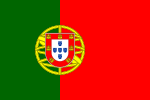
Back Portugese nasionale sokkerspan Afrikaans Selección masculina de fútbol de Portugal AN منتخب البرتغال لكرة القدم Arabic فريق البورتوجال لكورة القدم ARZ Seleición masculina de fútbol de Portugal AST Portuqaliya milli futbol komandası Azerbaijani پورتوقال میلّی فوتبال تیمی AZB Футбол буйынса Португалия йыйылма командаһы Bashkir Tim nasional sépakbola Portugal BAN Зборная Партугаліі па футболе Byelorussian
 | |||
| Nickname(s) | A Seleção das Quinas (The Team of the Escutcheons)[1] Lusos (Lusitanians) | ||
|---|---|---|---|
| Association | Portuguese Football Federation (Federação Portuguesa de Futebol, FPF) | ||
| Confederation | UEFA (Europe) | ||
| Head coach | Roberto Martínez | ||
| Captain | Cristiano Ronaldo | ||
| Most caps | Cristiano Ronaldo (217) | ||
| Top scorer | Cristiano Ronaldo (135) | ||
| Home stadium | Estádio Nacional | ||
| FIFA code | POR | ||
| |||
| FIFA ranking | |||
| Current | 7 | ||
| Highest | 3 (May–June 2010, October 2012, April–June 2014, September 2017–April 2018) | ||
| Lowest | 43 (August 1998) | ||
| First international | |||
(Madrid, Spain; 18 December 1921) | |||
| Biggest win | |||
(Almancil, Portugal; 11 September 2023) | |||
| Biggest defeat | |||
(Lisbon, Portugal; 25 May 1947) | |||
| World Cup | |||
| Appearances | 8 (first in 1966) | ||
| Best result | Third place (1966) | ||
| European Championship | |||
| Appearances | 9 (first in 1984) | ||
| Best result | Champions (2016) | ||
| Nations League Finals | |||
| Appearances | 1 (first in 2019) | ||
| Best result | Champions (2019) | ||
| Olympic Games | |||
| Appearances | 4 (first in 1928) | ||
| Best result | Fourth place (1996) | ||
| Confederations Cup | |||
| Appearances | 1 (first in 2017) | ||
| Best result | Third place (2017) | ||
| Website | fpf.pt | ||
The Portugal national football team (Portuguese: Seleção Portuguesa de Futebol) has represented Portugal in men's international football competitions since 1921. The national team is controlled by the Portuguese Football Federation (FPF), the governing body for football in Portugal. Portugal's home games are played at the Estádio Nacional stadiums in Portugal, and its primary training ground and technical headquarters, Cidade do Futebol, is located in Oeiras. The head coach of the team is Roberto Martínez,[4] and the captain is Cristiano Ronaldo, who also holds the team records for most caps and most goals.
Portugal's first participation in a major tournament finals was at the 1966 World Cup, which saw a team featuring Ballon d'Or winner Eusébio finish in third place. Portugal also made it to the semi-finals of the UEFA Euro 1984, losing to hosts and eventual winners France. Under the team's first golden generation in the 1990s, Portugal began consistently featuring in the European Championship and World Cup; they made the semi-finals of the 2006 World Cup, finishing in fourth place, along with placing as runners-up at Euro 2004 as hosts, and reaching the semi-finals of Euro 2000 and Euro 2012. This was in great part due to the production of several world class players, such as fellow Ballon d'Or winners Luís Figo and Cristiano Ronaldo.[5][6]
In 2016, Portugal won its first-ever major trophy, Euro 2016, defeating hosts France in the finals. With the win, Portugal qualified and made its only appearance in the FIFA Confederations Cup held in Russia, where they finished in third place. Portugal qualified for and hosted the brand new 2019 Nations League finals where they triumphed, defeating the Netherlands and earning their second major tournament victory in three finals. Portugal also appeared in the Olympic football tournament, and made it to the semi-finals at the 1996 Summer Olympics in Atlanta, finishing in fourth place.
Portugal is colloquially referred to as the Seleção das Quinas (a synecdoche based on the flag of the country) and has notable rivalries with Brazil, due to shared cultural traits and heritage,[7] France, due to several important meetings between the two teams at the Euros and World Cup,[8] and Spain, known as A Guerra Ibérica in Portuguese or The Iberian War in English, with the rivalry between two countries going back to 1581.[9]
Portugal is set to co-host the 2030 edition when it was granted host status alongside Morocco and Spain.
- ^ Selecção das Quinas refers to the five shields ("Team of the Escutcheons") or the five dots inside them ("Team of the Bezants") in the Portuguese flag, used until the 70s as the shirt badge. Refer to Flag of Portugal for symbolism associated with these bezants.
- ^ "The FIFA/Coca-Cola Men's World Ranking". FIFA. 24 October 2024. Retrieved 24 October 2024.
- ^ Elo rankings change compared to one year ago. "World Football Elo Ratings". eloratings.net. 14 November 2024. Retrieved 14 November 2024.
- ^ Demony, Catarina (15 December 2022). "Portugal coach Santos leaves job after World Cup exit". Reuters. Archived from the original on 15 December 2022. Retrieved 15 December 2022.
- ^ "Two trophies in three years – A Golden era for Portuguese football". 10 June 2019. Archived from the original on 6 August 2020. Retrieved 12 September 2019 – via www.tugascout.com.
- ^ "Portugal Will Never Win a Major Tournament:The Three Reasons Why". 20 April 2009. Archived from the original on 6 August 2020. Retrieved 12 September 2019 – via www.tugascout.com.
- ^ Wilson, Jeremy (25 June 2010). "Portugal 0 Brazil 0: match report". Archived from the original on 11 January 2022 – via www.telegraph.co.uk.
- ^ "From Xavier to Batta: how controversy shaped Portugal v France rivalry". The Guardian. 5 July 2024. Retrieved 30 September 2024.
- ^ Coelho, João Nuno (1998). ""'On the Border': Some Notes on Football and National Identity in Portugal". Fanatics! Power, Identity and Fandom in Football. Londres: Routledge. pp. 158–172. ISBN 978-1-134-67729-0. Retrieved 26 May 2014.